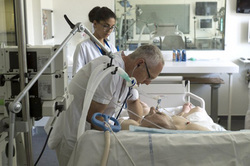 South American researchers have created the algorithm calculates the probability of sudden cardiac arrest and respiratory patients clinics on the basis of their history of the disease, says New Scientist. South American researchers have created the algorithm calculates the probability of sudden cardiac arrest and respiratory patients clinics on the basis of their history of the disease, says New Scientist.
The system can be informed in advance about the dangerous development of events (at best 4 hours).
In the South American hospitals doctors and nurses consider the condition of the patients, and to begin the risk of emergency situations requiring intensive care patients, according to the special card ("modified scale early prevention ", MEWS). It shows 4 symptom: systolic blood pressure, heart rate, blood pressure and temperature.
Sriram Somoni (Sriram Somanchi) from the Institute of Carnegie Mellon University in Pittsburgh introduced into the system data on 133 thousand patients who received healing in 4 of Chicago hospitals in 2006-2011. To call the resuscitation of them had in the joint complexity 815 times. The algorithm Comanche based on 72 sign posted in the stories of the disease (for example, age, level of glucose, the number of platelets in the blood), predicted the impending heart and breathing in 70 percent of cases. For comparison, healers on MEWS knew about the risk of a dangerous situation only 30 percent of cases.
However, the method remains to be subject to revision as it too often produces a "false alarm" (in 20 percent of cases). Comanche intend to correct it using the data acquired in the other hospitals.
Besides, not all scientists agreed with the value of the new system. Considering the opinion of Peter Donana (Peter Donnan), the professional of biological statistics from the University of Dundee (UK), MEWS brings more than useless, for it is based on the minimum list of features, and not all hospitals collect and preserve as much information about the patients, as Chicago. "From the point of view of statistics, the smaller model, the better it is," said the scientist.
sections: Society, World News
|